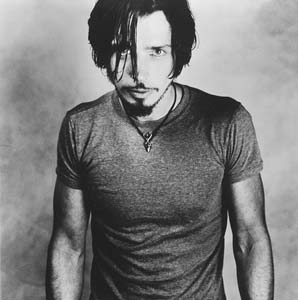![[Metroactive Music]](/music/gifs/music468.gif)
[ Music Index | San Jose | Metroactive Central | Archives ]
 When He's Up: Chris Cornell left Soundgarden with his dignity and his friendships intact. Cornell's Moody Blues Ex-Soundgarden star Chris Cornell mixes grunge and hobbit rock on solo release By Gina Arnold AT THE HEIGHT of that weird period now known as the "grunge era," the genre's naysayers (of whom there were far more than will now admit it) often felt compelled to compare grunge's genesis to discredited '70s hard-rock bands like Black Sabbath, Blue Öyster Cult and Led Zeppelin. Those poor misguided critics chose to ignore grunge's larger contextual nuances: bleak lyrics that described the alienation of a disenfranchised generation, a distinct lack of the staple demeaning words of hard rock ("mamma" and "baby," for instance) and, finally, the liberating sight of boys' flesh on boys' flesh in the pit. Those sights and sounds are now associated with Nirvana, but in fact Soundgarden and Fluid were the two groups that began those trends, which explains why Soundgarden should really be regarded as the flagship band of grunge. Soundgarden was the one group whose sound, look, attitude and lyrics best personified the grunge movement--that is, the real grunge movement, not the fake plaid commercial one that emphasized long hair and drugs. Indeed, the members of Soundgarden were drug-free, hence their continued success both before and after grunge's high-water mark, circa 1993. Soundgarden played loud, smart, heavy songs about personal angst. In a highly unusual move for a successful rock band, the members broke up in 1997 at the height of their creative power, still friends, still solvent and with their dignity intact. That separation has paved the way for the release of lead singer Chris Cornell's first solo LP, Euphoria Morning (UNI/A&M). Euphoria Morning is a really good record, but it must be said that with the grunge trappings stripped away, all that's left in Cornell's work are those very '60s and '70s hard-rock elements that had critics in a tizzy back in 1992. Not to put to fine a point on it, but here Cornell is singing the moody blues. His style recalls late-'60s acts like Quicksilver Messenger Service, the Paul Butterfield Blues Band, Cream and the Yardbirds--blue-eyed blues, seven- and 12-bar stuff inspired by Muddy Waters. "When I'm Down," for example," is pure Eric Clapton. "Mission" is the song closest to the old Soundgarden, an almost atonal wah-wah sound that uses Cornell's wailing vocals as an extra instrument. Euphoria Morning opens with a really lovely song titled "Can't Change Me" that's very much in the vein of "Black Hole Sun" or "Fell on Black Days." It almost perfectly combines a pop sensibility with Cornell's hard, cool style. Cornell uses a great deal more acoustic guitar than ever before, at times evoking late-period Beatles. The record has its experimental moments, especially at the back end. At times, it doesn't sound a bit like classic head-banging Soundgarden. "Sweet Euphoria" is an acoustic number. "Disappearing One" is a strangely Beatlesesque tune with a queer, effective melody running through its atmospheric, meandering vocals. On occasion, Cornell seems much more like a hobbit than the angst-ridden grunge god he once was. He always just skirts actual feyness, though. The album's closer, "Steel Rain," could well be the best mix of grunge and hobbit rock ever heard. THE BIG DIFFERENCE between Soundgarden and Cornell solo, however, isn't so much musical as emotional. Soundgarden always cultivated a superattractive aura of aloofness. Cornell has long been the physical and vocal embodiment of the tortured male id: sensitive and humane but much too macho to tell you what he was really feeling. He's still not exactly a mushy guy, but the sound of him singing lines like "When you miss somebody, you tell yourself a hundred thousand times nobody ever lives forever" and "Now I know I don't want to be alone today" is quite affecting. Perhaps his closest comparison, however, is very early Boz Scaggs, circa "Loan Me a Dime" and "Slow Dancer." The Scaggs comparison is almost uncanny, with this difference: Cornell's voice is more resonant and more beautiful. It still outshines most of the voices on radio today and it certainly beats those early white hippie blues boys hollow. Indeed, that quality--along with Cornell's poetic vision--makes this record a classic rock winner, destined to be played alongside new ones by the Dave Matthews Band and Robert Cray. That's probably not where Cornell himself--with his sexy, exciting past--really envisions himself, but given the choices these days, it's not that bad a place to be. [ San Jose | Metroactive Central | Archives ]
|
From the September 9-15, 1999 issue of Metro, Silicon Valley's Weekly Newspaper.
Copyright © 1999 Metro Publishing Inc. Metroactive is affiliated with the Boulevards Network.
For more information about the San Jose/Silicon Valley area, visit sanjose.com.